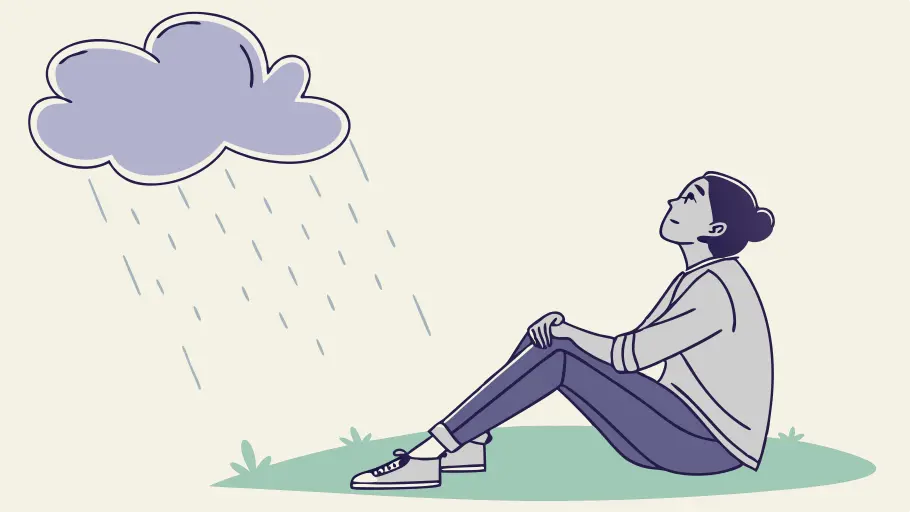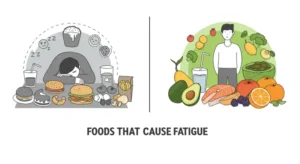Table of Contents
Ever found yourself dragging through the day, downing your third cup of coffee before noon, and still feeling like you’re moving through quicksand? You’re not alone. Persistent low energy remains a prevalent concern impacting daily functioning and quality of life.
But here’s the thing – that exhaustion isn’t random. There’s always a reason behind the fog, and finding it is the first step toward getting your spark back.
Let’s break down what might be draining your battery and how to fix it.
What Medical Conditions Could Be Causing My Fatigue?
When fatigue becomes your new normal, it’s time to look under the hood. Several medical conditions have been linked to fatigue.
Anemia: When your body lacks sufficient red blood cells or hemoglobin, less oxygen reaches your tissues. The result? That classic “I can barely get off the couch” exhaustion.
Thyroid Issues: Your thyroid is basically your body’s gas pedal. With hypothyroidism, everything slows down – metabolism, heart rate, digestive system – leading to persistent fatigue, weight gain, and even depression if left untreated.
Sleep Apnea: You might be spending eight hours in bed but getting zero quality rest. Sleep apnea repeatedly interrupts your breathing (and consequently your sleep cycles), leaving you exhausted regardless of how long you’ve been horizontal.
Heart Disease: When your cardiovascular system is compromised, your heart works overtime to pump blood, leaving you drained. Even mild heart conditions can manifest primarily as fatigue before other symptoms appear.
If your tiredness persists despite lifestyle changes, don’t self-diagnose. A simple blood test could identify these issues and put you on the path to treatment and renewed energy.
Could My Diet Be Causing Low Energy?
Your body is an incredibly complex machine that needs specific fuel to function optimally. Missing even one nutrient can throw the whole system off balance.
Iron Deficiency: Beyond full-blown anemia, even borderline-low iron levels can leave you exhausted. Your body needs iron to make hemoglobin, which carries oxygen to your tissues.
B Vitamin Shortages: Think of B vitamins as your cellular energy production team. Liquid vitamin B12 is especially valuable for nerve function and red blood cell formation, and it’s a convenient supplement form for those with absorption issues or dietary restrictions.
Vitamin D Depletion: This sunshine vitamin does more than strengthen bones – it also regulates mood and energy levels. During winter months or if you’re consistently indoors, your levels can plummet.
Magnesium Insufficiency: This mineral is involved in over 300 biochemical reactions in your body, including energy production. Low magnesium can manifest as fatigue, muscle cramps, and irritability.
| Nutrient | Energy-Related Function | Foods Rich In It |
| Iron | Oxygen transport to tissues | Red meat, spinach, lentils, fortified cereals |
| Vitamin B12 | Nerve function, red blood cell formation | Animal products, nutritional yeast, fortified foods |
| Vitamin D | Hormone regulation, mood stabilization | Fatty fish, egg yolks, sunlight exposure |
| Magnesium | Energy production, muscle function | Nuts, seeds, whole grains, dark leafy greens |

How Does Poor Sleep Quality Affect Energy Levels?
You might be in bed for eight hours, but that doesn’t mean you’re getting restorative sleep.
Insomnia: Difficulty falling or staying asleep doesn’t just affect your night – it wrecks your entire next day. While occasional sleep troubles are normal, chronic insomnia requires intervention.
Poor Sleep Hygiene: Your pre-bed routine matters more than you think. Screen time before sleep suppresses melatonin production, making quality sleep harder to achieve. A recent study found that just one hour of screen time at bedtime results in a 59% higher risk of insomnia and 24 fewer minutes of sleep.
Inconsistent Sleep Schedule: Your body craves routine. Irregular sleep patterns confuse your internal clock, making it harder to feel properly rested even when you do sleep enough hours.
Undiagnosed Sleep Disorders: Beyond insomnia and sleep apnea, conditions like restless leg syndrome or periodic limb movement disorder can fragment your sleep without you even realizing it.
Improving your sleep environment and habits is often the most underrated energy booster. Creating a cool, dark, quiet sleep sanctuary and sticking to consistent sleep and wake times can dramatically improve your energy levels.
Can Stress and Mental Health Issues Drain My Energy?
That mental load you’re carrying? It’s physically exhausting.
Chronic Stress: When your body is constantly in “fight or flight” mode, your adrenal glands work overtime producing cortisol and adrenaline. Eventually, this leads to stress-related exhaustion disorder and profound fatigue.
Anxiety and Depression: These conditions don’t just affect your mood – they’re energy vampires. Both can disrupt sleep, increase stress hormones, and make even simple tasks feel overwhelming.
Mental Overload: Decision fatigue is real. Each choice you make throughout the day depletes your mental energy, leaving you exhausted by evening.
Mental health is physical health. Techniques like meditation, deep breathing, and cognitive-behavioral therapy can mitigate stress and insomnia, breaking cycles of psychological exhaustion.

How Do Daily Habits Affect My Energy Levels?
Sometimes, the culprit behind your fatigue is hiding in plain sight – in your daily routine.
Dehydration: Even mild hydration deficits reduce plasma volume, forcing your heart to work harder and leaving you feeling drained. By the time you feel thirsty, you’re already experiencing energy-sapping dehydration — a reminder of just how vital proper hydration is to sustaining energy levels.
Sedentary Behavior: It sounds counterintuitive, but regular movement actually creates energy. A sedentary lifestyle reduces mitochondrial efficiency (your cells’ power plants) and dopamine synthesis, leading to that “blah” feeling.
Poor Diet Choices: That afternoon sugar crash isn’t in your imagination. High-glycemic foods that cause fatigue trigger rapid glucose fluctuations, leading to energy crashes that leave you sluggish and craving more sugar.
Overtraining: On the flip side, excessive exercise without proper recovery can lead to overtraining syndrome, with chronic fatigue as a primary symptom.
Making small adjustments to these habits – staying hydrated, incorporating movement throughout your day, choosing complex carbs over simple sugars, and balancing workouts with rest – can provide significant energy boosts.
Could My Medications Be Making Me Tired?
That pill you’re taking for one condition might be causing fatigue as a side effect.
Common Medications: Several drug classes including antihistamines, blood pressure medications, and antidepressants often exacerbate tiredness.
Alcohol: While it might help you fall asleep initially, alcohol disrupts your sleep architecture, preventing the deep, restorative stages you need for true rest.
Caffeine Rebound: That morning coffee might be setting you up for an afternoon crash. Caffeine’s stimulating effects typically last 4-6 hours, often followed by a dip in energy as it wears off.
Never stop prescribed medications without consulting your doctor, but a medication review might reveal alternatives with less fatigue-inducing side effects.
How Does My Environment Impact My Energy?
Your surroundings affect your energy levels more than you might realize.
Air Quality: Poor ventilation and pollutants can increase inflammation and reduce oxygen efficiency, leaving you mentally and physically drained.
Light Exposure: Natural light helps regulate your circadian rhythm. The benefits of getting sunlight extend beyond mood boosts — it also plays a key role in syncing your internal clock and supporting energy regulation.
Electromagnetic Exposure: While research is still emerging, some studies suggest that constant exposure to electromagnetic fields from devices may indirectly impair energy through inflammation or melatonin suppression.
Simple environmental adjustments – like adding plants to your workspace, using a blue light filter on devices after sunset, or taking short outdoor breaks throughout the day – can help maintain your natural energy rhythms.

What Are The Most Effective Ways To Boost Energy Naturally?
Reclaiming your vitality requires a multi-faceted approach.
Medical Intervention: If you suspect a medical cause, consult a healthcare provider. Treatments like iron supplementation for anemia, levothyroxine for hypothyroidism, or CPAP therapy for sleep apnea can be transformative.
Nutritional Strategy: Rather than random supplementation, get tested for specific deficiencies and supplement accordingly. Focus on nutrient-dense foods as your primary strategy.
Sleep Optimization: Improve sleep hygiene by establishing a consistent schedule, creating a sleep-friendly environment, and limiting screen time before bed. If problems persist, consider polysomnography to identify sleep disorders.
Stress Management: Implement stress-reduction techniques like meditation, deep breathing, or cognitive behavioral therapy. These approaches have been shown to mitigate the energy-draining effects of chronic stress.
Movement Medicine: Aim for 150 minutes of moderate activity weekly to enhance mitochondrial biogenesis and dopamine release, countering fatigue.
When Should I See A Doctor About Fatigue?
While some energy dips are normal, certain symptoms warrant medical attention:
- Fatigue that persists for more than two weeks despite lifestyle changes
- Extreme exhaustion after minimal exertion
- Fatigue accompanied by unexplained weight loss, fever, or pain
- Feeling too tired to perform daily activities
- Thoughts of self-harm related to exhaustion
Don’t dismiss chronic fatigue as “just getting older” or “being busy.” Proper diagnosis and treatment can restore the energy you thought was permanently lost.
What’s The Bottom Line On Beating Low Energy?
Low energy arises from interconnected physiological, nutritional, and psychological disruptions. It’s typically the result of several factors affecting your physical and mental wellbeing.
The good news? By systematically addressing each potential cause – from medical conditions and nutrient deficiencies to stress and lifestyle habits – you can reclaim your vitality.
Start with the basics: quality sleep, proper hydration, nutrient-dense foods, and regular movement. If your energy doesn’t improve, seek medical evaluation to identify less obvious causes.
Remember, persistent low energy isn’t something you should just accept as your new normal. It’s a sign that something in your body or life needs attention – and addressing it could open the door to a level of vitality you’ve forgotten was possible.
What energy-draining habits have you noticed in your own life? Have you found particular strategies that helped restore your energy? Share your experience in the comments below!





